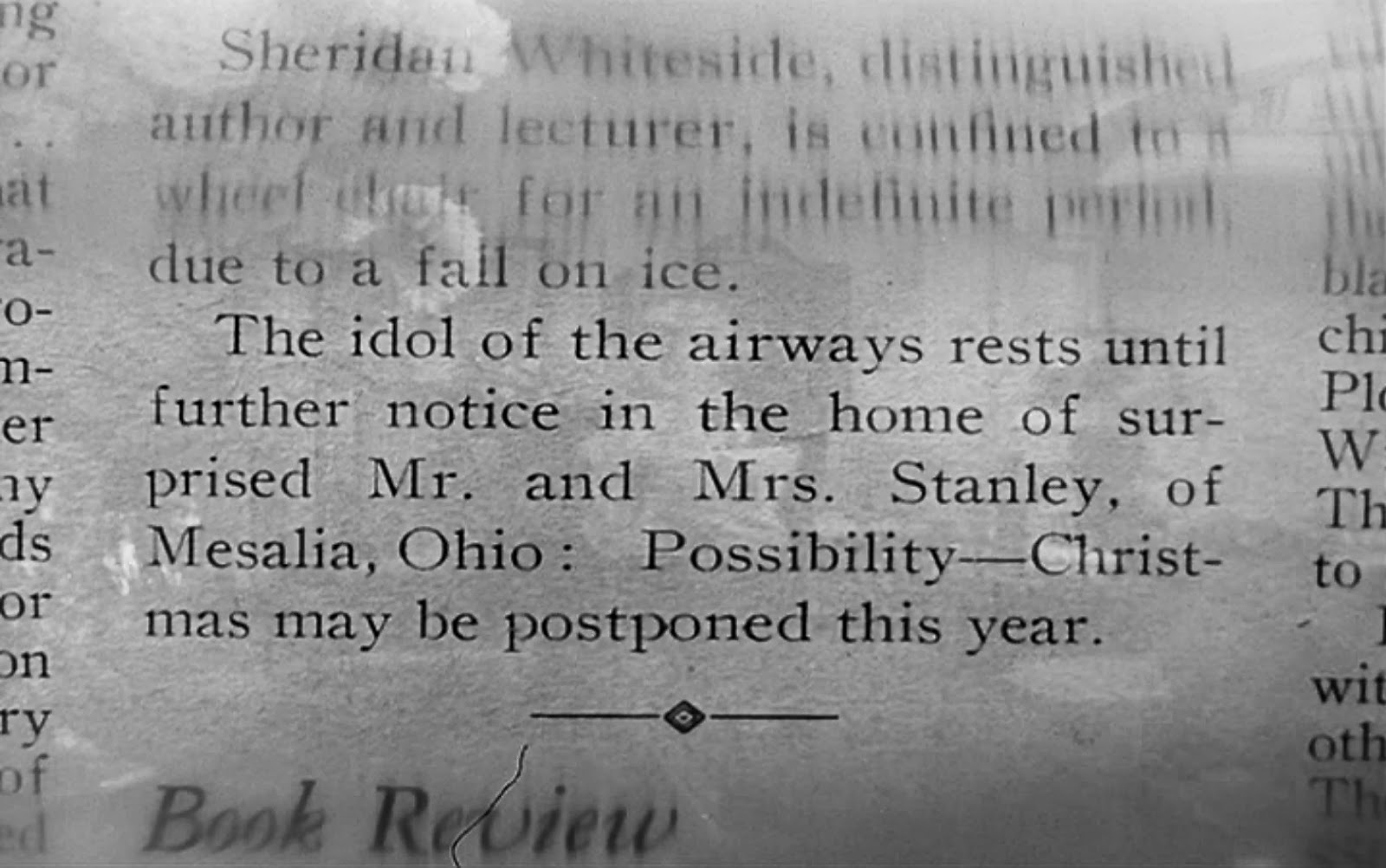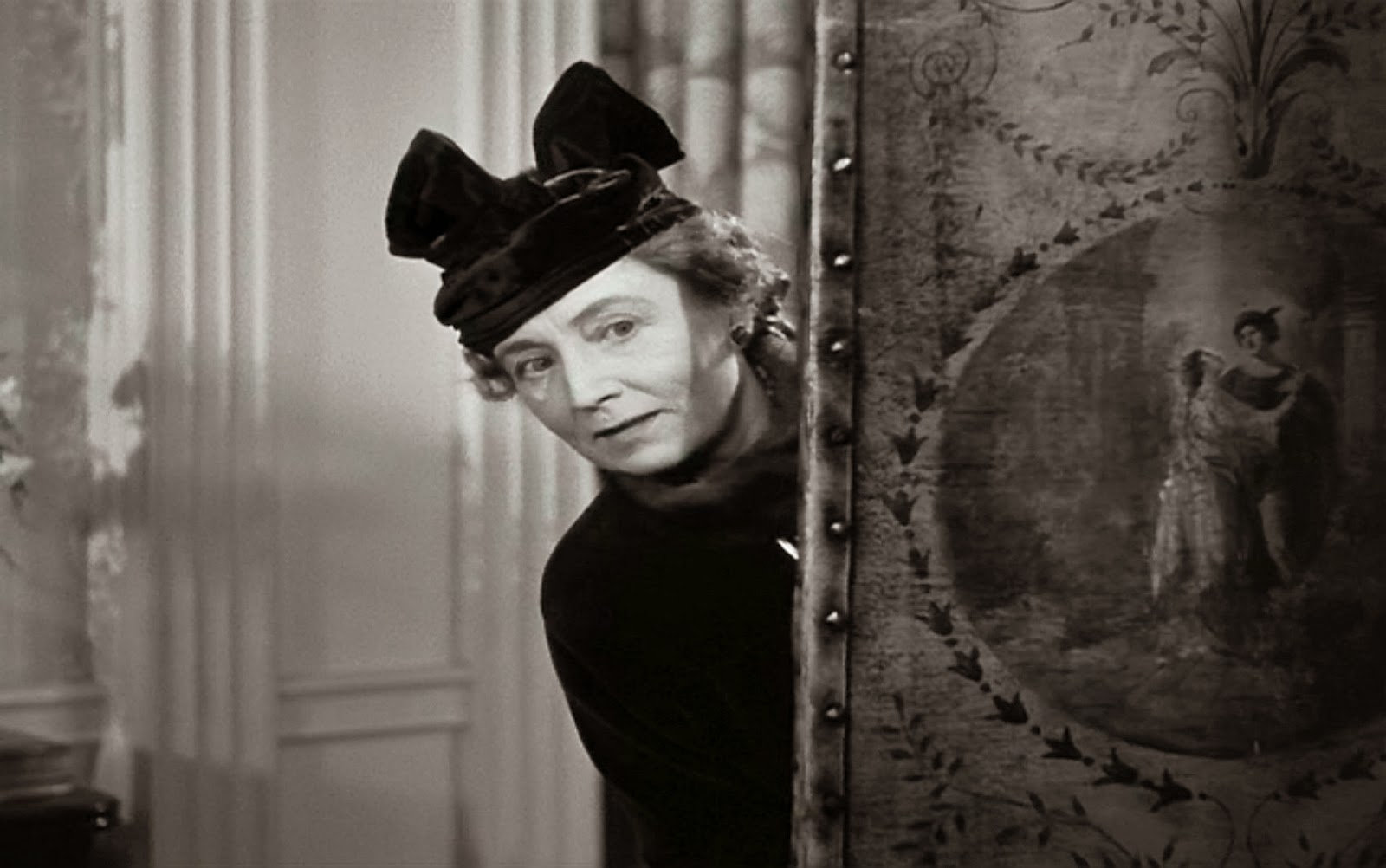Premiered January 12, 1942, went into wide release on January 24.
"Christmas is Mr. Whiteside's personal property, he invented it, it belongs to him. Tomorrow morning , very first thing, Mr. Whiteside will open each and every present and he'll raise the biggest stink you've ever seen in your life."
-Maggie Cutler
Famous (and famously acid-tongued) radio personality and man of letters Sheridan "Sherry" Whiteside (Monty Woolley) travels to Mesalia, Ohio to give a lecture.
Upon arrival, he immediately starts belittling everyone he meets. Sherry has been invited to dine at the upper middle-class home of Daisy (Billie Burke) and Grant Stanley (Grant Mitchell). He attempts to get out of it saying, "I simply will not sit down to dinner with midwestern barbarians, I think too highly of my digestive system."
As it happens, Whiteside slips on the front steps of the Stanley home and suffers an injury, leaving him unable to walk, but certainly able to exercise his acerbic wit.
Sherry cannot leave the Stanleys' house and threatens to sue them for a large sum of money.
 |
| Newspaper gossip column item about Sherry's unscheduled stopover in Mesalia, OH |
 |
| Maggie: "When I finally leave this job, I may write a book about it ... Through the Years with Prince Charming." |
They spend time together ice skating and sharing hot sweet potatoes.
 |
| Maggie: "I've been skating for the first time in my life! I'm told I'm the only person to do a figure eight from the sitting position!" |
 |
| Bert shares his play with Maggie |
The house is constantly visited by various friends, fans and townspeople.
Whiteside continues to treat all the locals like they're idiots. He receives telephone calls from around the world (billed to the Stanleys, of course) and assorted strange parcels and presents like a live octopus,...
four penguins, a baby seal ...
and an Egyptian sarcophagus (!) from well-wishers.
Maggie tells Sherry that she wants to marry Bert. Whiteside decides to sabotage Maggie's budding romance by inviting his friend, actress Lorraine Sheldon (Ann Sheridan) to Mesalia.
 |
| Lorraine and her lady's maid Cosette (Nanette Vallon) |
 |
| Maiden Aunt Harriet Stanely |
Christmas arrives, and so does Sherry's friend Banjo (Jimmy Durante).
It's obvious to Banjo that Sherry is trying to break up Maggie and Bert, so Banjo tries to discourage his efforts. But is it too late? And what mystery lurks behind the smile of Harriet Stanley?
J.A. Morris says:
(Some minor SPOILERS below)
This is a great adaptation of a classic play. It's written by Moss Hart and George S. Kaufman, two of the greatest playwrights of their time, and this story holds up pretty well today. Even though it contains 1940s popular culture references, the dialogue still feels fresh. It doesn't hurt that it was adapted for the screen by Julius and Phillip Epstein (who won an Oscar for Casablanca).
 |
| Lorraine arrives in Mesalia. |
Christmas is talked about throughout the movie, but doesn't rear its head in force until the last act. We're given the impression that Whiteside exploits the holiday sentiments simply to make himself look better, while abusing everyone in sight.
 |
| Mrs. Stanley receives a call from a famous American woman. |
 |
| Banjo manhandles Nurse Preen |
Two members of the cast also appear in other Christmas features: Durante is famous among my age group for narrating the animated adaptation of Frosty The Snowman. Mary Wickes, who plays Nurse Preen here, portrayed housekeeper Emma Allen in White Christmas.
The Man Who Came To Dinner is highly recommended, especially for fans of classic theater. And if you only know Durante from Frosty, this film is a great way to "discover" his talent.
J.A. Morris' rating:
Four Candy Canes!
RigbyMel says:
If you enjoy classic screwball comedies, you will enjoy The Man Who Came To Dinner. The snappy patter works even though some references are dated and might go over the heads of a modern audience.
Monty Woolley's portrayal of the acerbic Sheridan Whiteside is worth seeing all by itself. However, I like that all the characters are interesting and are made more so because of the talented actors portraying them. Jimmy Durante and Mary Wickes are standouts in supporting roles. It's also fun to see Bette Davis in a comedic/romantic role.
For the record, Jimmy Durante's song "Did You Ever Have The Feeling That You Wanted To Go?" was actually written by Durante himself.
 |
| "A penguin bit me!" |
 |
| A boys' choir participates in Whiteside's Christmas radio broadcast |
 |
| Harriet gives Sherry a Christmas present |
 |
| Penguins! |
 |
| Spoiled actress Lorraine Sheldon explores a possible new role |
 |
| Banjo adds his hat to the Christmas decorations |
RigbyMel's rating:
3 and a half candy canes





















_07.jpg)



















